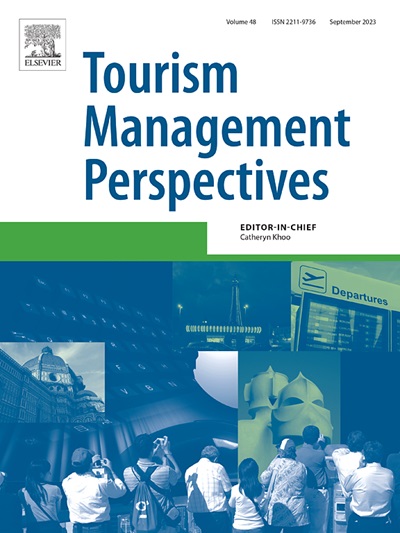How visual and textual information influences repeat tourists: Insights from self-report data and an eye-tracking experiment
IF 6.9
2区 管理学
Q1 HOSPITALITY, LEISURE, SPORT & TOURISM
引用次数: 0
Abstract
It remains unclear how visual and textual information in destination pictures influences potential repeat visitors to revisit. This study investigates how tourist-generated content influences positive recall emotions and affects potential repeat tourists' willingness to revisit when viewing destination pictures and text. This study conducts a 2 × 2 between-subjects factorial experiment combined with eye-tracking. Visual information varied by category (space vs. subject), and textual information was manipulated as absent or present. The results indicate that compared with subject-category destination pictures, space-category destination pictures are more effective in inducing tourists' positive recall emotion and willingness to revisit. Positive recall emotions evoked by the pictures mediate the relationship between destination pictures and tourists' willingness to revisit. In addition, textual information moderates the effect of visual information on emotions and willingness to revisit. However, the moderated mediating effect of positive recall emotions is only observed in the absence of textual information. These findings offer insights for destination marketing to attract repeat tourists.
视觉和文字信息如何影响回头客:来自自我报告数据和眼动追踪实验的见解
目前尚不清楚目的地图片中的视觉和文字信息如何影响潜在的回头客。本研究探讨旅游内容如何影响正面回忆情绪,并影响潜在的回头客在观看目的地图片和文字时再次访问的意愿。本研究采用结合眼动追踪的2 × 2被试析因实验。视觉信息随类别(空间与主题)而变化,文本信息被操纵为缺席或在场。结果表明:空间类目的地图比主题类目的地图更能有效地诱导游客的积极回忆情绪和再游意愿。图片所唤起的积极回忆情绪在目的地图片与游客重游意愿之间起到中介作用。此外,文本信息调节了视觉信息对情绪和再访意愿的影响。然而,积极回忆情绪的调节中介作用仅在缺乏文本信息的情况下被观察到。这些发现为目的地营销吸引回头客提供了见解。
本文章由计算机程序翻译,如有差异,请以英文原文为准。
求助全文
约1分钟内获得全文
求助全文
来源期刊

Tourism Management Perspectives
Multiple-
CiteScore
15.60
自引率
3.40%
发文量
99
审稿时长
59 days
期刊介绍:
Tourism Management Perspectives is an interdisciplinary journal that focuses on the planning and management of travel and tourism. It covers topics such as tourist experiences, their consequences for communities, economies, and environments, the creation of image, the shaping of tourist experiences and perceptions, and the management of tourist organizations and destinations. The journal's editorial board consists of experienced international professionals and it shares the board with Tourism Management. The journal covers socio-cultural, technological, planning, and policy aspects of international, national, and regional tourism, as well as specific management studies. It encourages papers that introduce new research methods and critique existing ones in the context of tourism research. The journal publishes empirical research articles and high-quality review articles on important topics and emerging themes that enhance the theoretical and conceptual understanding of key areas within travel and tourism management.
 求助内容:
求助内容: 应助结果提醒方式:
应助结果提醒方式:


